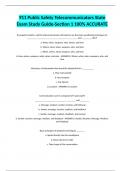Exam (elaborations)
911 Public Safety Telecommunicators State Exam Study Guide-Section 1 100% ACCURATE
- Course
- Institution
To properly classify a call the telecommunicator will need to use the basic questioning techniques of: ________, _________, ________, ________, ________, and _________ (p17) a. What, when, weapons, who, where, and how b. Where, what, when, weapons, who, and how c. When, where, what, weapons, who...
[Show more]



